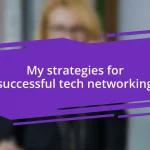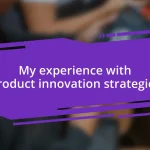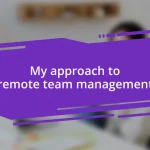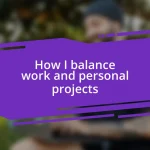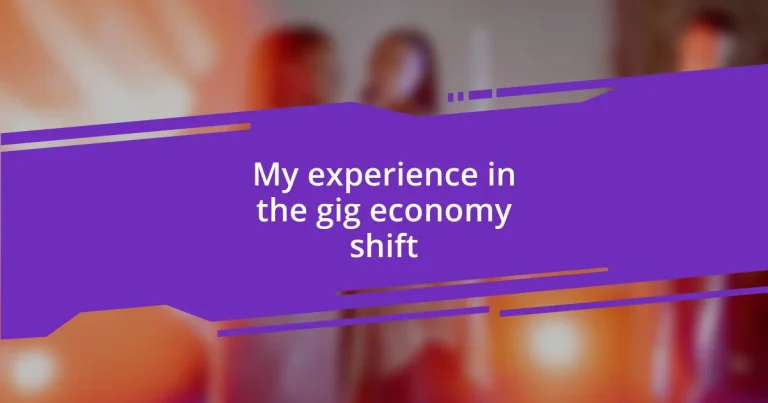Key takeaways:
- The gig economy offers flexibility and autonomy but can also lead to job insecurity and the need for self-reflection on professional goals.
- Choosing the right gig platform is crucial for success; aligning personal skills and work styles with platform characteristics impacts workload and earnings.
- Adaptability, networking, and setting boundaries are essential for thriving in the gig economy, helping maintain balance and quality of work.
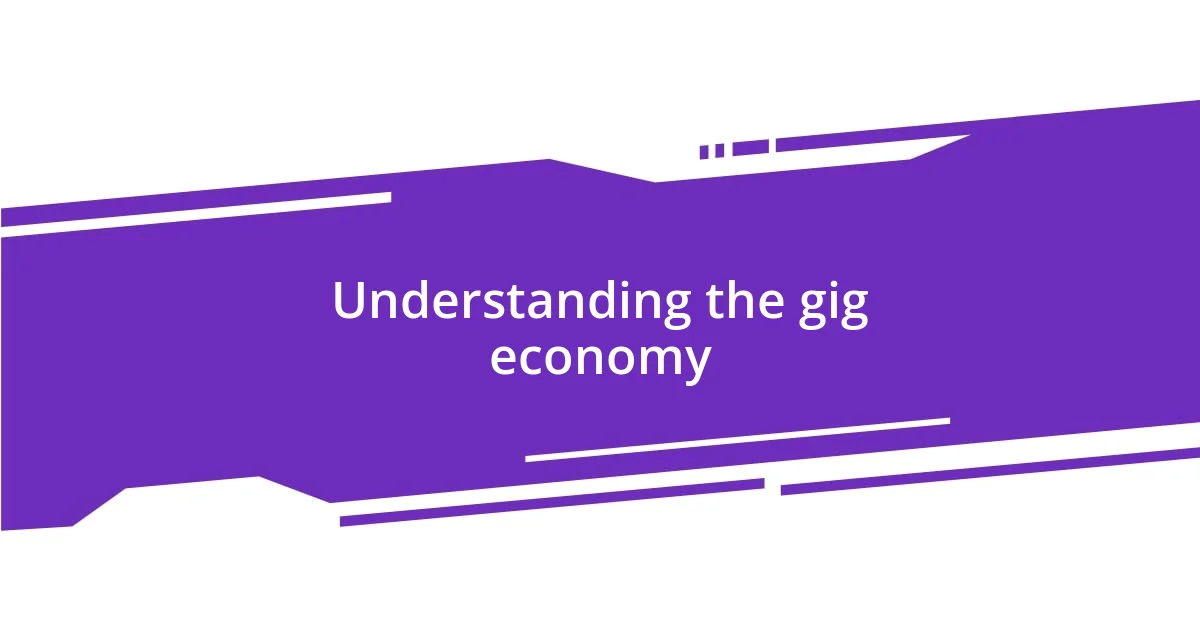
Understanding the gig economy
The gig economy represents a shift from traditional employment to a more flexible way of working, where tasks and projects are often short-term and require specific skills. I remember the first time I took on a freelance project—there was a mix of excitement and anxiety. Was I making the right choice, stepping away from a steady paycheck for potential instability? This very question looms in the minds of many who explore gig opportunities.
In this landscape, platforms like Uber, Upwork, and TaskRabbit have transformed how we view work—allowing individuals to monetize their skills or time on their terms. I often reflect on how liberating it was to set my own hours, yet I also felt the weight of the constant hustle. It’s fascinating how this model empowers individuals, but it also raises concerns about job security and benefits, making many wonder, “Am I trading one form of stress for another?”
Ultimately, understanding the gig economy is about recognizing both its allure and its complexities. Can flexibility truly outweigh the uncertainties it brings? In my experience, while it opened doors to new opportunities, it also challenged me to redefine my relationship with work and security, all of which prompted deep reflections on what I truly want from my professional life.
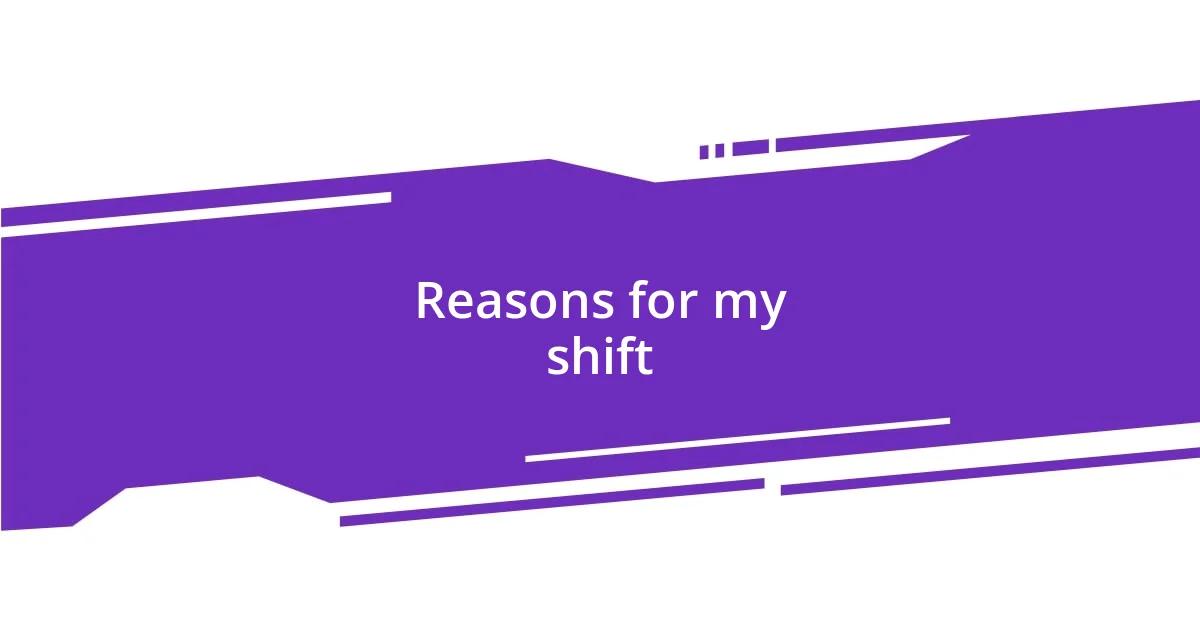
Reasons for my shift
Stepping into the gig economy was not just a career choice for me; it was a lifestyle adjustment. I craved autonomy and the thrill of exploring diverse projects that kept my creativity alive. Working on various tasks allowed me to tap into different skills I never knew I had, and that was incredibly rewarding.
Here are some reasons that fueled my shift into this new realm:
- Flexibility: I wanted to break free from the 9-to-5 grind.
- Variety: Engaging in diverse projects kept me stimulated and motivated.
- Skill Development: I realized I could acquire new skills quickly in different areas.
- Earning Potential: There was a chance to increase my income based on how much effort I put in.
- Personal Satisfaction: The fulfillment of completing a project on my own terms was exhilarating.
Each of these factors played a significant role in driving my decision to embrace the gig economy, shaping a journey that felt uniquely mine.
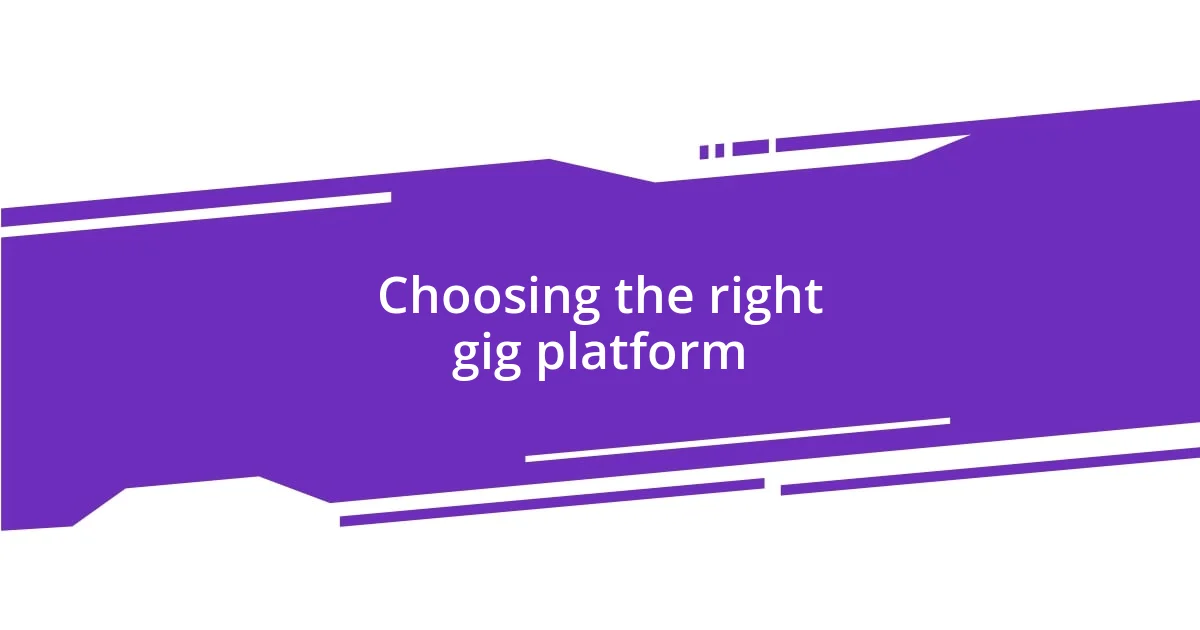
Choosing the right gig platform
Choosing the right gig platform can feel like navigating a maze. I remember my first time logging onto Upwork, scrolling through countless profiles and job postings. It hit me how crucial it was to find a platform that matched my skills and work style. Some prioritize flexibility, while others focus on skill specialization. It’s vital to identify what factors are most important to you—be it user experience, fees, or the type of gigs available.
While exploring the options, I discovered that not all gig platforms serve the same purpose. Each has its unique audience and approach. For instance, platforms like Fiverr are great for creative services, while others like TaskRabbit cater to local tasks. I found it helpful to consider not only where my skills fit best, but also which platform’s community felt right for me. Do I prefer a competitive landscape, or a more collaborative atmosphere? Assessing such criteria can make a significant difference in your satisfaction and success.
Through trial and error, I learned the importance of aligning my goals with the right platform. Choosing wisely has a direct impact on my workload and earnings. I’m grateful I started with a solid understanding of what I valued most—whether it was building a professional network or maximizing my income potential. Being clear on my preferences ultimately made the process smoother and more rewarding.
| Platform | Type of Work | Fees | Strengths |
|---|---|---|---|
| Uber | Ride-sharing | 20% | Flexibility and independence |
| Upwork | Freelance projects | 20%-5% | Diverse opportunities and a global reach |
| Fiverr | Creative services | 20% | User-friendly and quick setup |
| TaskRabbit | Local tasks | 15% | Immediate local work and varied tasks |
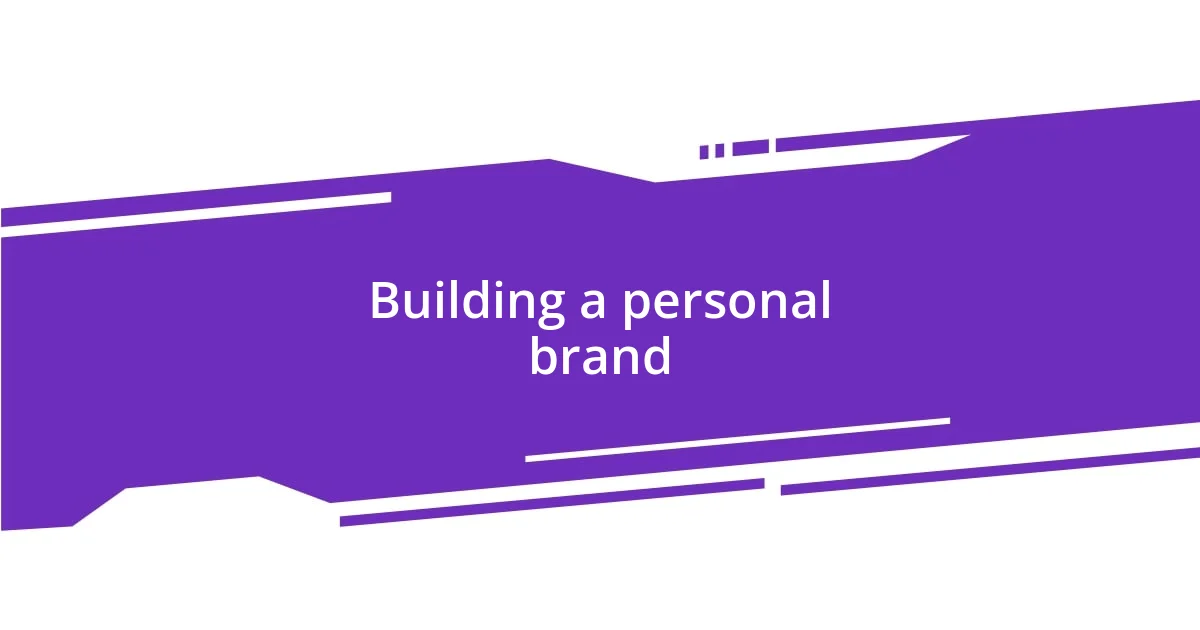
Building a personal brand
Building a personal brand in the gig economy isn’t just about showcasing skills; it’s about creating an authentic identity that resonates with your target audience. I recall when I first started sharing my experiences on social media. The feedback was overwhelming! It wasn’t just about promoting my work; people connected with my story. Have you ever considered how your journey could inspire someone else?
As I developed my online presence, I realized that consistency was key. I made a commitment to share insights, successes, and even failures regularly. This transparency fostered trust and attracted clients who appreciated my authenticity. I often reflect on how my vulnerability became a strength. It’s fascinating how embracing your true self can set you apart from the crowd!
Crafting visual elements, like a cohesive color scheme or logo, added another layer to my brand. I remember diving into graphic design tools to create a logo that encapsulated my style. This process felt like putting a piece of my personality into my work. I believe that every gig professional should ask themselves: How do I want to be perceived? Building a personal brand offers a chance to explore and express that image to the world.
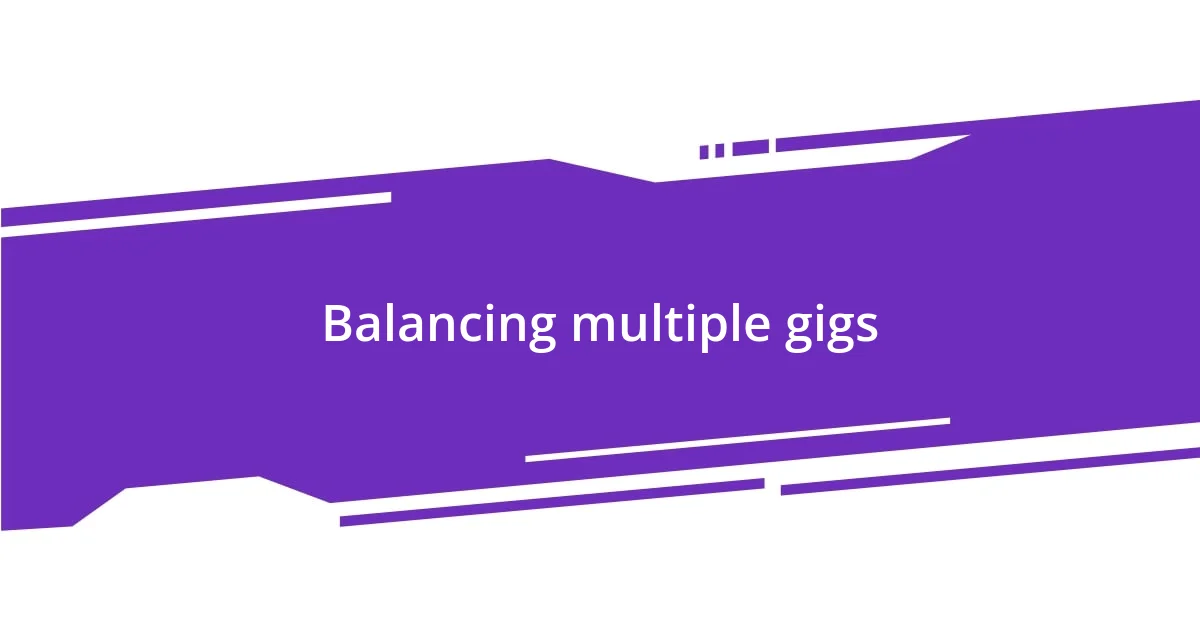
Balancing multiple gigs
Balancing multiple gigs has definitely been a juggling act for me. I remember the first time I took on two projects at once—I felt the excitement and the anxiety all rolled into one. How do you prioritize tasks when every gig feels urgent? I found that creating a detailed schedule was my saving grace. By allocating specific time slots for each project, I started to see how manageable it could actually be.
As I dove deeper into the gig economy, I realized that communication is crucial when balancing gigs. For instance, I once had to reach out to a client about my availability for a project while also managing expectations on another job. How often do you find yourself torn between commitments? I learned the hard way that honesty can prevent a lot of stress. Clients appreciate your transparency, and it often leads to better collaboration.
I’ve also discovered the importance of self-care during this balancing act. With multiple gigs, burnout can sneak up on you. I once felt overwhelmed after taking on too much work—trust me, that lesson was a tough one. I started incorporating breaks and downtime into my routine, and it made a world of difference. Have you ever felt like you were losing control? I now prioritize my well-being, ensuring I’m at my best for each gig, both for myself and my clients.
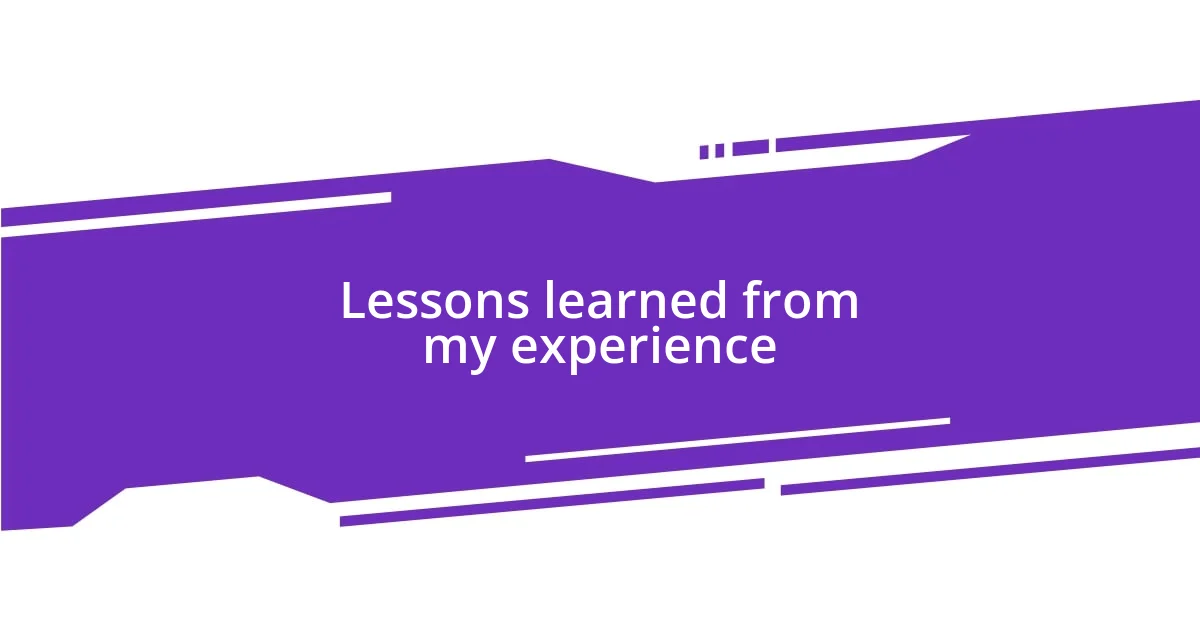
Lessons learned from my experience
One of my biggest lessons from the gig economy has been the importance of adaptability. I vividly remember a project where I had to pivot mid-course due to unexpected client feedback. That experience taught me that flexibility can transform a potential crisis into an opportunity for innovation. How do you handle changes when they come your way? Embracing uncertainty can lead to creative solutions that not only satisfy your client but also enhance your skills.
Another key takeaway for me has been the power of networking. At first, I thought that my work would speak for itself, but I quickly learned that building relationships was just as vital. I remember attending a local meetup where I met some fantastic people who not only shared their experiences but also referred clients to me later on. Have you ever underestimated the value of a simple conversation? That evening underscored for me that relationships in this space can lead to unexpected opportunities.
Lastly, setting boundaries has been a revelation. I used to say “yes” too often, thinking it would demonstrate my commitment or help me land more gigs. I recall a particularly taxing month where I ended up working late into the night on multiple projects—exhaustion set in, and my productivity suffered. Have you found yourself stretched too thin? I’ve since learned that saying “no” occasionally can actually uplift my work quality and leave room for personal growth. Prioritizing what matters to you ultimately cultivates a more sustainable career in the gig economy.
